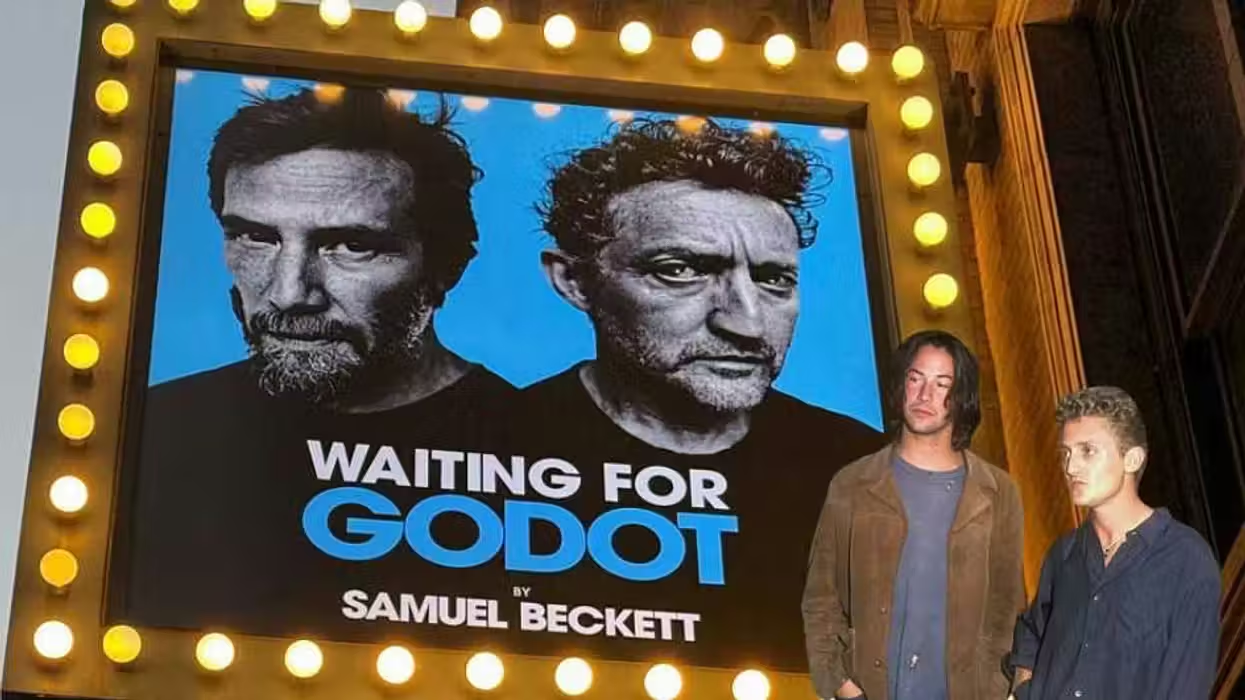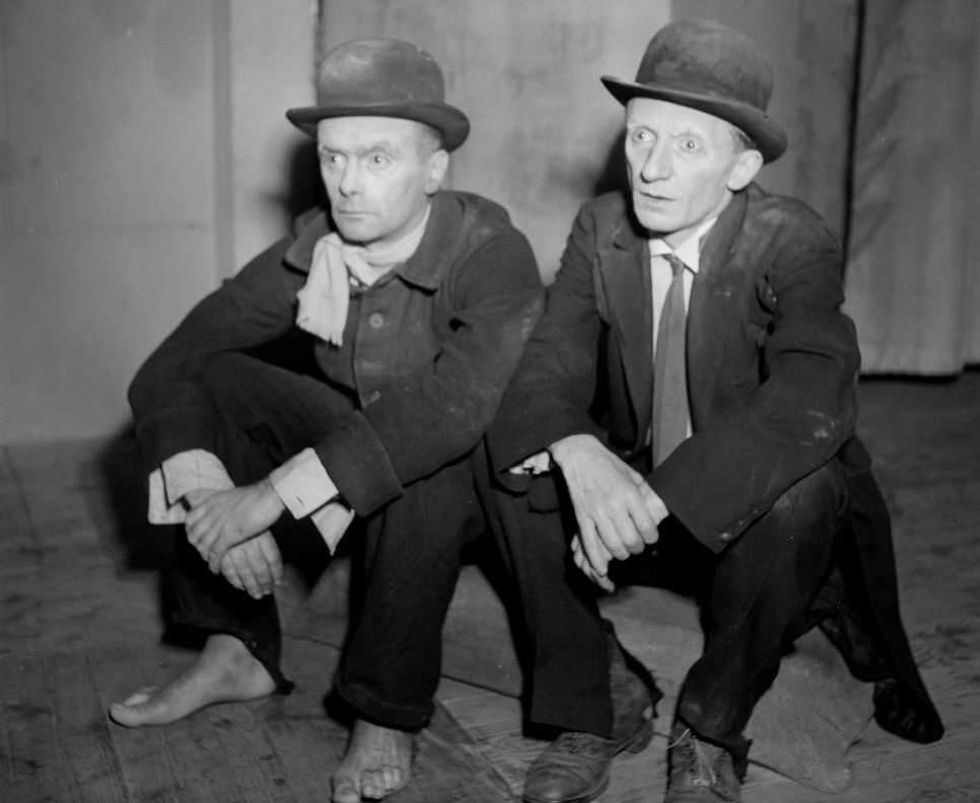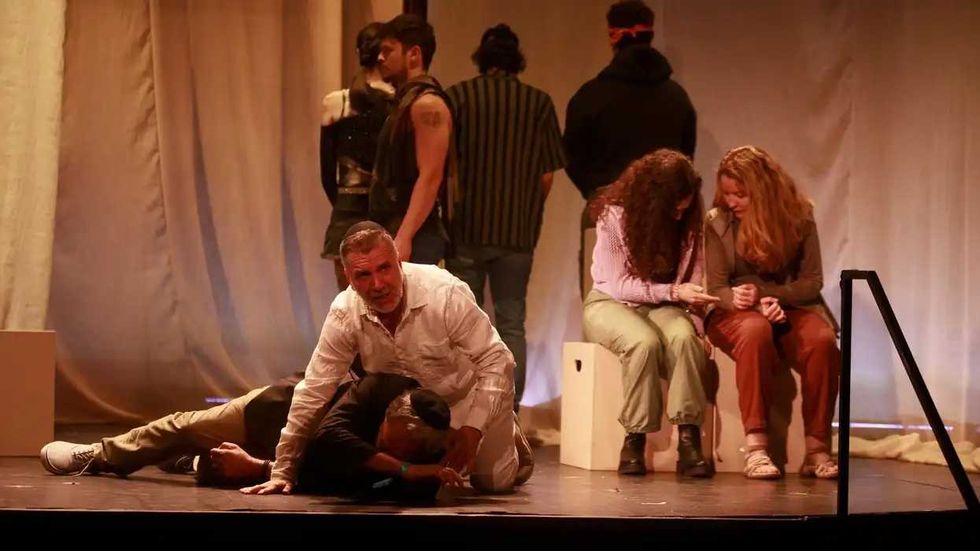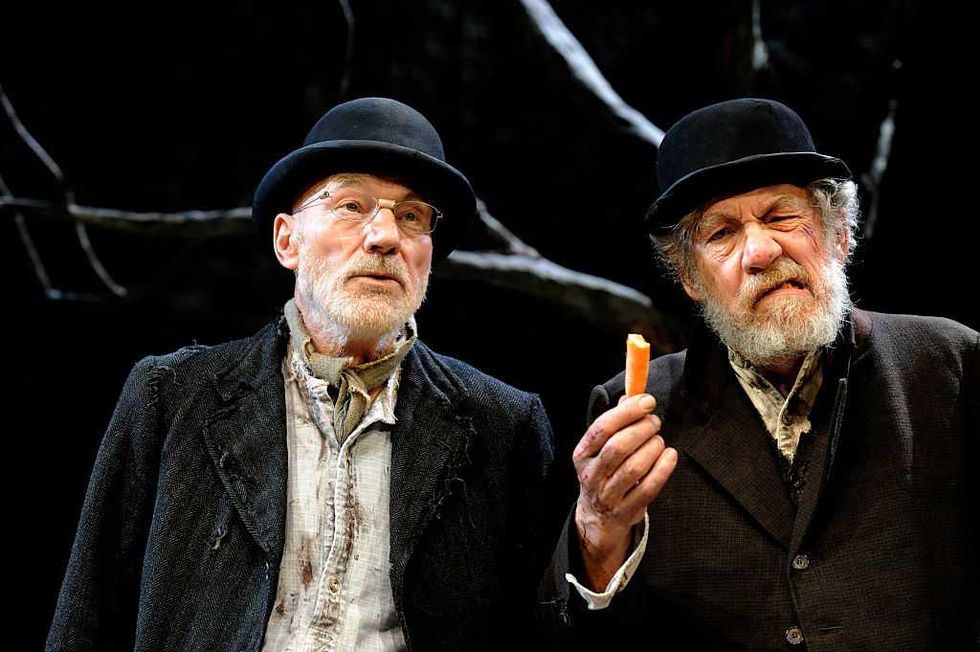
Bruce Glikas/Michael Ochs Archives/Getty Images
Existential boredom hits different when you have a fully charged phone.
Bill & Ted are Waiting for Godot.
That was the pitch. I’m going to attend a matinee performance of "Waiting for Godot," Samuel Beckett’s tragicomedy in two acts, at the Hudson Theater on Broadway. After which I will review Bill S. Preston, Esquire’s and Ted "Theodore" Logan’s excellent adventure into the theatre (with a hard “re”) of the absurd.
Were I waiting for Godot, I’d pass the time pretty much the way I did during intermission: by deleting spam voicemails offering me personal loans and tax relief.
I’m sure that was also the pitch to bring together Keanu Reeves and Alex Winter to play Estragon and Vladimir, respectively. The marketing is right there. But the play itself — which has a couple of winks to the "Bill & Ted" trilogy — will keep you waiting for the Wyld Stallyns to show up.
Spoiler: They, like Godot, never do. Instead, Reeves and Winter are Estragon and Vladimir in full — waiting brilliantly.
It’s wild to watch an action-hero mainstay like Reeves pull off Estragon: weak, bootless (at times it’s one boot, other times it’s both), can’t remember yesterday or even parts of today, regularly beaten by thugs off stage …
There’s no sign of John Wick or Johnny Utah in his performance and certainly no Neo. If the play’s two acts were "The Matrix," there’s no red pill to free him or Didi (his affectionate name for Vladimir) from it. If anything, it’s as if the companions have been damned by an overdose of blue pills.
“Who am I to tell my private nightmares to if I can't tell them to you?” Estragon asks his friend, with whom he shares a waking nightmare.
Winter’s Vladimir compliments his Gogo (his nickname for Estragon). Not with kind words — there are many times when he’s quite brutal to his friend — but with warm embraces, his own coat, carrots and radishes, and ways to pass the time, as they wait for Godot, which Vladimir constantly has to remind Estragon that they’re doing.
For what purpose? Why are they waiting for Godot? No one knows.

Director Jamie Lloyd makes some great choices, from casting to staging and sound design. Every version of the play I’d seen before had kept the setting to Beckett’s minimal specifications. Act one opens on “A country road. A tree. Evening.” And in act two, we learn that some time has passed, hence, “The tree has four or five leaves.”
Instead of planting the tree on stage, Lloyd has the cast address the tree out somewhere in the audience. So I got to imagine the following happening somewhere above my face:
VLADIMIR
… What do we do now?
ESTRAGON:
Wait.
VLADIMIR:
Yes, but while waiting.
ESTRAGON:
What about hanging ourselves?
VLADIMIR:
Hmm. It'd give us an erection.
ESTRAGON:
(highly excited). An erection!
All the action happens in or around a huge tunnel that’s been built on the stage. The tunnel looks really cool — like something you could skateboard on — and it aids the physical comedy. Picture a barefoot Reeves running up a half-pipe only to slide down and pass out into sleep. At times, the tunnel appears to open and shut like the aperture of a camera, and its design is used to manipulate the sounds of the play, both the music and spoken lines.
The supporting cast is powerful. Pozzo, played by Brandon J. Dirden, is scary, imposing, and cruel — especially to his “pig” Lucky (played by Michael Patrick Thornton), who is in a wheelchair. I thought Lloyd chose to put the actor in a wheelchair, but it turns out Thornton is actually paralyzed in real life and uses one. So not a choice per se? — but it works. A lucky break.
The first time I read "Waiting for Godot" was in high school. I have Brother Jeff — who was the sole Franciscan in a school of Marists — to thank for feeding me and the rest of our AP English class a bibliography of dread. So in addition to "Godot," we read James Joyce’s “The Dead,” T.S. Eliot’s “The Love Song of J. Alfred Prufrock,” and other works that explored the meaninglessness and senselessness of life that I was not prepared for.
I may still not be prepared for it. It’s been 25 years since I graduated from Catholic school, and "Godot" still haunts me: “Down in the hole, lingeringly, the grave-digger puts on the forceps.”
Going into the Hudson Theater, I thought Lloyd might play up the "Bill & Ted" angle and set the play in a Circle K parking lot — you know, where the dudes encounter the phone-booth time machine and Rufus (George Carlin) for the first time.
But phone booths aren’t a thing any more, so I thought a more accurate contemporary version of "Waiting for Godot" would be Vladimir and Estragon texting each other their dialogue — “Nothing to be done 😢” — followed by two acts of doomscrolling.
RELATED: Haunting play 'October 7' lets Hamas terror survivors speak

The official Instagram account for the play shared a post that leaned into the year 2025 with a cute group chat between Estragon, Vladimir, and Godot. Godot is typing (as depicted with an ellipses), and the phone has existentially low battery life. But alas, none of the characters in the show has an iPhone — not even a beeper.
The play is a real nostalgia trip. Beckett’s masterpiece is over 70 years old, the leads were once teen heartthrobs, they’re wearing bowler hats, and it’s a throwback to a time when boredom was possible.
When was the last time you were bored — when you felt the weight of waiting?
Thanks to my phone, boredom is almost an impossibility. Before showtime, I scrolled — until I was told it was time to put my phone away. Were I waiting for Godot, I’d pass the time pretty much the way I did during intermission: by deleting spam voicemails offering me personal loans and tax relief. I could imagine purgatory doing nothing but this. What could be worse?
Well, “in the midst of the COVID-19 pandemic, Ethan Hawke and John Leguizamo performed in a Zoom version of 'Godot.'" There’s your answer.

I think part of the greatness of "Godot" has to do with Beckett’s creation of characters that really take the form of the actors portraying them. Casting friends makes sense. I don’t know how close Pierre Latour and Lucien Raimbourg were when they were cast to perform the first presentation of "En Attendant Godot" in Paris in 1952. Maybe they were the Bill and Ted of their day?
On Instagram, actor Eric Stolz shares his memory of the 1988 production starring Robin Williams and Steve Martin: “I’ve often thought that Beckett would have loved that Production, the absurdity they embraced brought it into the realm of the Marxs [sic] Brothers, which to me is a great compliment.”
After going down the "Godot" rabbit hole, I found that the duo that really nailed it for me was Ian McKellen and Patrick Stewart. As much as I love Reeves’ and Winter’s performances, I have to admit my ageism. The boys — ages 61 and 60 — are just too young and fit for the roles.
McKellen and Stewart were in their 70s when they contemplated hanging themselves from that lone tree and argued over the salvation of the crucified thief in the Gospels. And it really works, because they’re old men. Vladimir has to piss uncontrollably, Estragon is senile, and they both stink like old men stink. Because they’re old men.
Vladimir and Estragon are excited over an erection — even if they have to hang themselves to get one — because they’re old and impotent. That joke’s been on my mind for 25 years — but now I realize that beyond the shock of the thought, the joke only really lands if we’re seeing old men deliver it. And while Keanu and Winter nail the back-and-forth — I literally loled — I don’t believe they’d need to commit suicide to get a hard-on.
I admit that I may have been influenced by a video I watched of Ian McKellen where he talks about "Waiting":
But what are they waiting for? I think the play’s been so popular over the years because Beckett was the first person to realize that an awful lot of life is about waiting. You were probably all waiting to come tonight. Probably in the odd moments in the last week when you’ve been thinking [mimes looking at his watch]: Christmas, or birthday, or holiday, or examinations; waiting to go to college, waiting to meet the right person. My age, waiting for death. We’re all waiting. What we’re doing is passing time. Getting through. … And Godot’s just a bit of hope to make life a little better.
After the curtain call, when the house lights came up, an usher was waiting to speak to a woman in my row. Apparently the woman had been recording the performance on her phone. You won’t find her footage online. She was forced to delete it. The play runs through early January 2026. Don’t wait to see it. It’ll pass the time.
Lou Perez